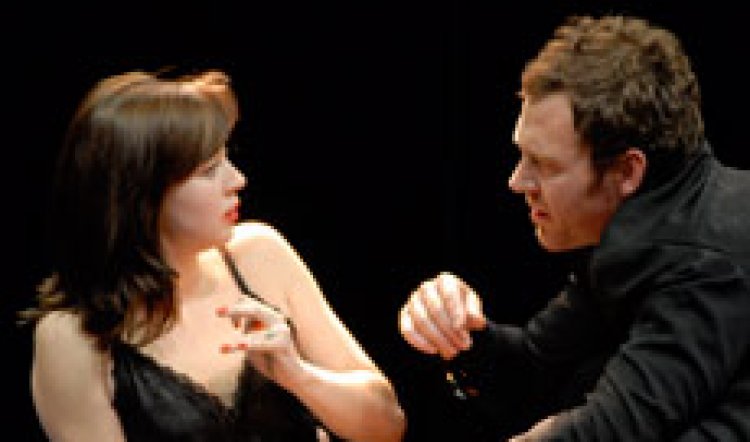
Who's Afraid of Virginia Woolf?
Who's Afraid of Virginia Woolf? Belvoir St Theatre, Sydney, August 8 to September 16; www.belvoir.com.au or (02) 9699 3444.
When Edward Albee's play first shocked theatregoers rigid in 1962, it was because Who's Afraid of Virginia Woolf? had ripped the lid off the post-war dream of stability and niceness that was the 1950s and exposed the nasty wriggling reality of life for millions of ordinary men and women.
As well as the more predictable after-effects of modern warfare, the aftermath of those years of world-wide uncertainty, fear and conflict was unimagined upheaval for the institution of marriage. It had been a largely unacknowledged - and little-understood - trauma for couples to discover their inability to relate or carry on "married life" in the hitherto prescribed fashion. For many, what turned out to be as painful and damaging as war wounds was that, after years of independence, women were suffering the incomprehensible frustration of meekly returning to the kitchen sink to play happy housewife, while their men were recast as plodding 9-5 providers and supposedly able to take charge of their lives and those of their dependants.
The result was carefully concealed alienation and emotional mayhem as, within the four walls of their homes, women turned into raging, nagging harridans, while the men retreated into sullen, passively aggressive skirmishing. Meanwhile, in public, all was sweetness and light in a landscape of neatly ironed shirts, neatly combed children and neatly trimmed front lawns. Then along came Edward Albee and totally shredded the facade of normalcy and niceness, even as he thinly disguised the universal portrait of modern marriage by setting it in a small town university.
No wonder it was branded obscene and shocking when first produced, albeit because one of the first utterances from archetypal frustrated wife Martha is: "Jesus H Christ!" Martha's robustly savoured attitude towards blasphemy is compounded by an equally ferocious position on liquor consumption. Hers is not a surreptitious "medicinal" Wincarnis Tonic Wine while cooking dinner. Not least because it's doubtful Martha would cook dinner, rather, anything she placed on a dining table would more likely be in the form of a sardonically burnt offering.
At the same time, Martha's voracious, if tragically desperate, appetite for life and sex placed female sexuality front and centre as never before. She affronted a society which still preferred to label such behaviour "nymphomania", yet which foreshadowed, by only a few years, the "free love" of the Swinging 60s. On the other hand, her husband George is a master of deception: ostensibly reasonable, calm and henpecked, he is the willing punchbag for Martha's rage to the point where it is she who is bruised and battered and he who remains standing. Nevertheless, it is a battle that both must win if the war of living is not to be lost. And the battle is to admit to the love which is at the core of their hatred. In the end George psychically kills Martha so that she and they can survive, together.

In so many ways, then, Who's Afraid of Virginia Woolf? is one of the great think pieces of 20th century theatre. It is perspicaciously and beautifully written; it is insightful, tender and unrelentingly honest and unsentimental. It is also wickedly, acerbically, brazenly funny and is powerful enough to withstand almost any kind of directorial deconstruction or roughshod ride over its text.
Director Benedict Andrews has chosen to strip the play of its period setting, American accents and also the playwright's casting instructions, the better to reveal the play itself. Robert Cousins' set is a brutally elegant raised square of gleaming black floor, glass walls and chrome finished glass coffee table and black leather armchairs, made even more stark by Niklas Pajanti's dramatic white lighting. It's not a neutral setting, however. The whiff of what Sydney real estate agents love to call "edgy living" is literally overpowering. If the actors survive the season without awful bruising or worse it will be a miracle. (Rather than focus attention on the play, it's difficult not to be frequently distracted by their efforts to get on and off the set and to stay upright in the gradually spreading puddles of ice-melt, vomit and spilt scotch. This applies particularly to the two women, who do all this in fetishistic stiletto heels.)
The agglomeration of accents on stage is another reason to occasionally wonder what it's all about. Robin McLeavy and Simon Stone (the hapless guests, Honey and Nick - a really fine, intelligent performance from McLeavy and solid support in the less interesting role from Stone) are middle-Australia; Catherine McClements - the daughter of what we would know as the Vice Chancellor - is almost Strine at times. Marton Csokas's George, on the other hand, adopts a drawl which slips and slides somewhere between mid-Atlantic and Prague. There is little reason to ponder these voices except that much has been made of the choice to avoid American accents, yet the script itself remains peppered with Americanisms and period talk which spotlight the incongruities.
If distantiation is what Andrews seeks - and he quotes Kristeva, Lacan and other theorists of that period - then these factors, the alienating set and disembodied voices, would do it. (Quite literally disembodied and distanced in the final act because the actors are body-miked when the set turns to place glass between actors and audience.) However, the performance of McClements in particular is so powerfully undistanced, so immediate, tangible and emotionally reckless that it is impossible to be anything but mesmerised by her. In contrast, Csokas is the dispassionate - and generous - foil for McClements' volcanic eruptions and his coolness ultimately serves their joint trajectory, culminating in the truly touching and crystal-clear final moments.



